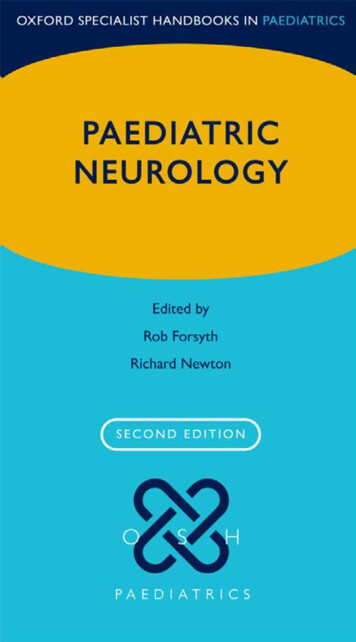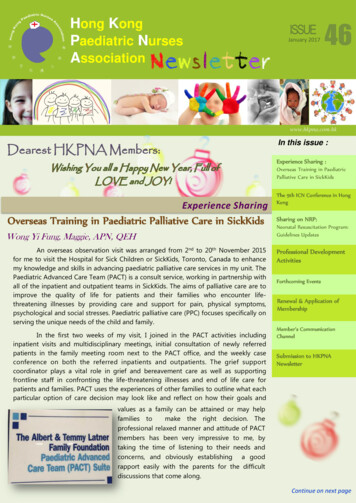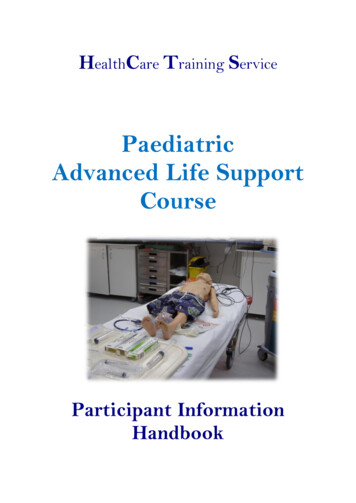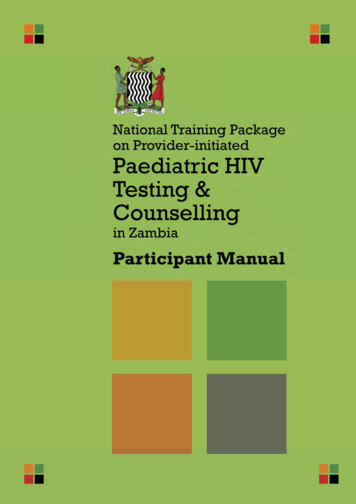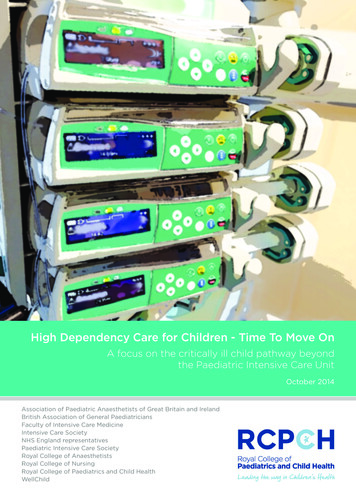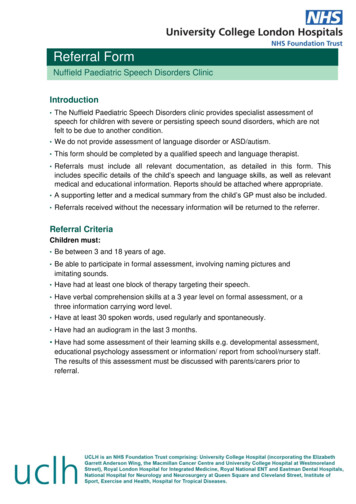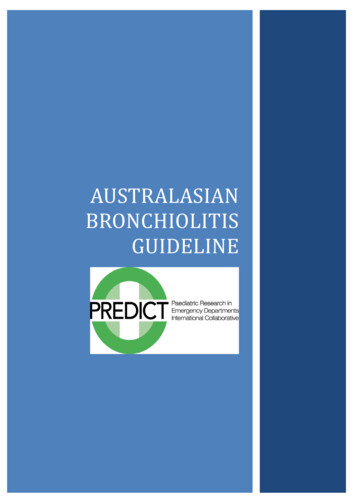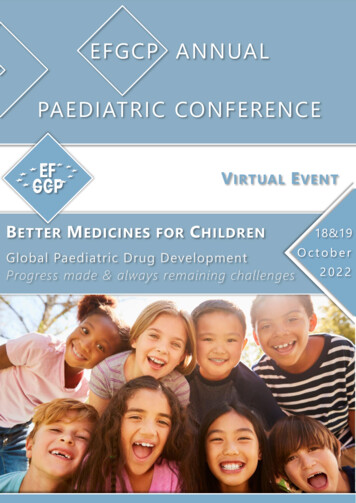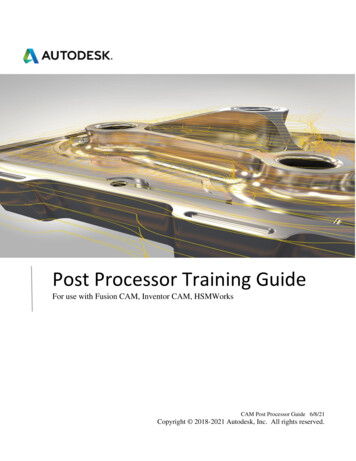![Medical Training Initiative Post [Paediatric Neurology]](/img/35/cardiff-paediatric-neurology-mti-job-description-for-march-2020.jpg)
Transcription
Cardiff and Vale University Health BoardMedical TrainingInitiative Post[Paediatric Neurology]Job DescriptionLead clinician: Dr Frances Gibbon2020Page 1 of 23
Hospital: Noah’s Ark Children’s Hospital for WalesDirectorate: Acute Child HealthGrade:ST4-8This is a 24-month post offered under the Medical Training Initiative scheme (MTI) run bythe Royal College of Paediatrics and Child Health.The post starts with 6 months in General Paediatrics of which the first 3 months at ST3level (SHO). This is because our experience and feedback from many previous MTIsstrongly emphasises that starting in General Paediatrics is an essential first step in settlinginto our Children’s Hospital. This is followed by 18 months at ST4-8 level in tertiary levelPaediatric Neurology.Please note the post has been quality assured by the MTI team at the RCPCH.Hours Per Week: 48Salary Scale:Specialty Registrar salary scale MN37 with a 2B (50%) bandingsupplement for out of hours work.Key Working Relationships:Paediatric Neurology is part of the Paediatric Neuroscience service delivered by theChildren’s Hospital for Wales. This service provides paediatric neurology, neurosurgery,neuro-rehabilitation, neuro-oncology, neurophysiology and neuroradiology and referrals arereceived from all the South and West Wales Health Boards. The paediatric neurology teamprovides shared medical care for all paediatric neurosurgical patients. The team also worksclosely with colleagues across all medical specialties, PICU and NICU.The paediatric neurology team consists currently of:3 consultants2 epilepsy nurse specialists (job-share)1 full time paediatric neurosurgery nurse specialist2 middle grades1 SHOConsultants in Paediatric NeurologyDr Frances GibbonPaediatric Consultant NeurologistDr Johann Te Water Naude Paediatric Consultant NeurologistDr Anurag SaxenaPaediatric Consultant NeurologistThe 3 consultants have subspecialty interests including epilepsy, ketogenic diet,adolescent epilepsy and VNS clinics, neuromuscular disorders, neuro-rehabilitation,neuro-oncology, white matter disorders and outreach clinics are held in neighbouringHealth Boards. Dr Gibbon is assistant secretary of the British Paediatric NeurologyAssociation (BPNA). Dr Te Water Naude is honorary secretary of the Welsh PaediatricSociety. Anurag?We have regular meetings with the multidisciplinary therapy team and a recently establishedneuro-rehabilitation service including physio, occupational, speech and language therapy,psychology, dietetics and others. We have close links with Clinical Genetics and regularneurogenetics meetings. We also work closely with Adult Neurosciences with a range of jointPage 2 of 23
clinics and opportunities to participate in the adult neuroscience meetings.The Unit has national approval for training in tertiary Paediatric Neurology (CSAC).Clinical Training Responsibilities Ward rounds and ward duties (2 large medical wards and shared care for theneurosurgical patients on the surgical ward).Neurological input to the care of children on paediatric HDU, PICU and NICU.Outpatient clinicsAttendance at multidisciplinary meetingsCo-ordination of investigations for children on the weekly GA list for MRI, includingliaison with special biochemistry and performance of lumbar punctures.Programme Description:This 2-year MTI fellowship is offered in conjunction with the Royal College of Paediatrics andChild Health MTI programme.InductionAll MTI candidates will receive a comprehensive induction programme to familiarise themwith the functioning of the hospital, the Trust’s procedures and issues of clinical governance.In addition, there is a specific induction to the department of Paediatric Neurology which willcover all aspects of working within the department.The ProgrammeAll MTI candidates will start training in General Paediatrics at ST3 level for the first 3 months,stepping up to ST4-8 (middle grade) level for the next 3 months. This is to allowacclimatisation with practice in the UK. The expectation is that the trainee will satisfy level 1& 2 acute competencies for General Paediatrics in this period. In the final 18 months oftraining candidates will be expected to complete level 3 competencies within Neurology asdiscussed with their educational supervisor. Consultant supervision and advice is availableat all times.Subject to performance, we will consider facilitating for your last 6 months a secondment ortransfer to another unit to acquire specific competencies of your interest, e.g. CommunityPaediatrics (management of neurodevelopmental disorders) or epilepsy surgery.Training, Education, E portfolio and ARCPMTI fellows working in Cardiff and Vale UHB will be to fully engage in our educationalprogram and learning opportunities in the same way as our Deanery trainees.Please note it is mandatory for all MTI fellows to maintain an RCPCH e-portfolio record oftheir training from start of the programme.Assessment of competencies will be through e-portfolio and an annual in housereview of curriculum progress (“ARCP”). A certificate stating the periods of trainingand competencies acquired is provided on completion of the programme.In addition fellows are required to have an annual appraisal, as are all health boardemployees.Departmental EducationThe range of educational opportunities available within the Department includes weeklyTuesday and Friday morning teaching ward rounds, neuroradiology and neurosurgery MDTs.Fellows are also expected to take part in acute scenario simulation training, to complete allmandatory training, including Safeguarding Level 3, and to attend the weekly teaching onMonday, Tuesday, Thursday and Friday lunchtime organised within Acute Child Health withthe last Friday of the month dedicated to guidelines. They will be released to attend theirPage 3 of 23
share of the twice monthly all day Wednesday teaching sessions organised by the WalesDeanery. Fellows are also invited to attend our MRCPCH exam practice teaching sessions.Outpatient ClinicsThese are considered an important part of the service and fellows will have the opportunityto be involved in this. The exact configuration of the timetable will be negotiated as part ofthe development of the individual learning plan with the Educational Supervisor. Clinics arerun every working day of the week.Working Pattern & Duty RosterThe fellows take part in a full-shift pattern of working to cover the out of hours service. Shiftpatterns include cycles of nights and long days (13hour shifts) and short days (08:30-16:30).Our rotas are New Deal and EWTD compliant and deliver the RCPCH curriculum.Educational SupervisionAll MTIs are allocated an Educational Supervisor who will be one of the Consultants theyare working with. A personal training plan will be developed at the beginning of the post tosuit the individual’s training needs. Progress will be monitored by regular appraisal.Research & AuditMTI Fellows will have the opportunity to contribute to clinical trials. Audit and QualityImprovement activities are expected and supported. The Liverpool Diploma (LSTM) is notmandatory but will be supported.Local Tutor supportThe Children’s Hospital employs a large number of doctors from across the world.In addition to two local tutors for Deanery Trainees, Child Health therefore has adesignated local tutor overseeing the learning and career development needs of allfellows who are not part of the Wales Deanery, including all MTIs.Code of ConductThe completion of a satisfactory health declaration questionnaire and screening is acondition of the appointment. The post holder must comply with the UK HealthDepartment guidance on "Protecting Health Care Workers and Patients fromHepatitis B" (PSM (93)12) as implemented by the UHB.b)Because of the nature of the work of this post it is exempt from the provision ofSection 4 (2) of the Rehabilitation of the Offenders Act 1974 (Exemption Order1975). Applicants are therefore not entitled to withhold information aboutconvictions of the Act. In the event of employment, failure to disclose suchconvictions could result in dismissal or disciplinary action. Any informationgiven will be completely confidential and will be, considered only in relation toan application to which the order applies.'c)The UHB will require the successful candidate to have and maintain fullregistration with a licence to practise with the General Medical Councilthroughout the duration of this contract.d)You are normally covered by the NHS Hospital and Community Health Servicesindemnity against claims of medical negligence.However, in certaincircumstances (e.g. in service for which you receive a separate fee or in anemergency situation outside of work) you may not be covered by the indemnity.The Health Departments, therefore, strongly advise that you maintainmembership of your medical defence organisation.Page 4 of 23
AccommodationThere is single accommodation you can book on the hospital campus. You will need to paythis yourself. Importantly, there is no double or family accommodation.Relocation ExpensesThe Child Health Directorate does not pay relocation expenses.Study Leave:30 days per annum, is incorporated in to the rota. This post does attract a 600 per annumstudy leave budget (equal to the budget of Deanery trainees).Time off for study leave is incorporated into the rota and may be granted for education purposesto attend courses at the discretion of the Clinical Director, provided the clinical service iscovered and must be planned well in advance. At least six weeks’ notice is required. A StudyLeave Approval Form must be completed and authorised by the Consultant and ClinicalDirector.Annual LeaveMTI fellows are entitled to 5 weeks annual leave per annum (rising to 6 weeks per annumupon reaching the third incremental point of the MN37 pay scale). Annual leave isincorporated into the rota and swaps may be arranged.Page 5 of 23
Appendix – description of Cardiff and Vale UHB and services within the Children’s HospitalCARDIFF AND VALE UNIVERSITY HEALTH BOARDBACKGROUNDCardiff and Vale University Local Health Board was established on 1st October 2009 and is one of thelargest in the UK, providing health services for over 500,000 people living in Cardiff and the Vale ofGlamorgan. We also serve a wider population of 2.5 million people across South and Mid Wales forspecialties such as paediatric intensive care, specialist children’s services, renal dialysis, cardiacservices, neurology, and medical genetics. We are also responsible for the delivery of NHS primary careservices in Cardiff and the Vale of Glamorgan, including general practitioners, community pharmacists,dentists and optometrists.Cardiff and Vale University Health Board’s nine hospitals are; Barry Hospital, Cardiff Royal Infirmary WestWing, Children’s Hospital for Wales, University Hospital Llandough, Rookwood Hospital, St. David’sHospital, University Dental Hospital, University Hospital of Wales, and Whitchurch Hospital. We are ateaching health board with close links to Cardiff University. The University boasts a high profile teaching,research and development role within the UK and abroad. Together we are training the next generationof medical professionals.THE HOSPITAL(s)University Hospital of WalesIn 1971, UHW was officially opened and rapidly established itself as one of the foremost teaching hospitalsin the UK and the flagship of Wales.Cardiff and Vale UHB is one of the largest health organisations in the United Kingdom with over 900 bedsand a budget of well over 1 billion. The hospital provides for the fullest integration of a 924-bed hospitaland medical school in one complex. Three blocks running north south with 6 subsidiary 'link' blocks comprisethe main complex. The main building is 10 storeys high, with numerous peripheral developments.Each week the hospital sees around 5,000 outpatients, 500 inpatients and 200 day cases. The Mainoperating theatre suite is one of the largest in Great Britain with 10 theatres and 12,000 cases per year.Emergency services are located within state of the art accommodation on the University Hospital of Walessite. It is an extremely busy department with approximately 100,000 attendances per year.Children’s Hospital for WalesThe Children’s hospital has a dual remit to provide secondary care the local population of Cardiff and theVale of Glamorgan and almost all tertiary services through the South Wales Network.This is an exciting time of expansion for all paediatric services in Cardiff, with the UHB having recentlyopened the final phases of the Children’s Hospital for Wales which has enabled the consolidation of allpaediatric specialities into a dedicated facility with five theatres, Paediatric Critical Care Unit (PHDU&PICU), Medical and Surgical Wards, a separate Paediatric Oncology ward and clinic area and parentsaccommodation, a teenage cancer unit, a large outpatient suite, designated Paediatric Radiology,Audiology, and an admission and assessment unit.Page 6 of 23
Further paediatric outpatient services are provided at Llandough Hospital and community paediatricservices are offered at both Llandough and St David’s Hospital.Unscheduled paediatric care currently has two points of entry into the Children’s Hospital, with GPreferrals to the Children’s assessment Unit located in the Children’s Hospital (8000 children per year)and self-referrals to the paediatric section of the Emergency Department (35,000 children per year).Paediatrics and ED sit under separate directorates but work closely together, with the ultimate aim of thedevelopment of a single point of entry.Child Health offers the following wide range of services, notably, General Paediatrics, CommunityPaediatrics, Paediatric Emergency Medicine, and tertiary Neonatology, Cardiology, Respiratory,Gastroenterology, Nephrology, Neurology, Endocrinology, Metabolic Medicine, Palliative Care,Paediatric Oncology, Critical Care. Paediatric Surgery, Trauma and Orthopaedics, Spinal Surgery,Neurosurgery, Urology, ENT and Ophthalmology.Clinical Director Acute CHClinical Director Community CHAssistant Clinical Director Quality and Safety:Assistant Clinical Director Junior Workforce:Dr Rim Al-samsamDr Sian MoynihanDr Rajesh KrishnanDr Siske StruikCARDIFF UNIVERSITYCardiff University’s School of Medicine is based on the site and consequently the hospital is regarded asthe major teaching hospital within Wales. With one or two exceptions the NHS service side is interlinkedwith professorial departments and both the NHS and School elements are heavily involved in researchand development and have gained eminent reputations both nationally and internationally.The University Department of Child Health is the academic limb to paediatric clinical services and has itsmain base at University Hospital of Wales led by Professor Sailesh Kotecha. The University has beensuccessful in attracting external funding from a wide range of bodies in the public and private sectors andperformed exceptionally well in the recent Research Assessment Exercise and Teaching QualityAssessment. Active research areas include acute general paediatrics, endocrinology, gastroenterologyand nutrition, neonatal medicine, determinants of infant mortality, paediatric respiratory and neonatal lungdisease. Research interests of the Department of Community Child Health include The Welsh ChildProtection Systematic Review Group www.core-inf.cf.ac.uk, primary research programme into thediagnosis of child abuse, accident prevention, domestic violence, vulnerable groups, and special needsof disadvantaged children.THE POSTS (Generic Information)Workload / Rota Arrangements / Example Timetable Normal working days are Mon-Fri for 8 hours. In addition you will do evening shifts, night shifts(in blocks of Mon-Thurs or Fri-Sun) and weekends (generically named ‘out of hours’ shifts).General Paediatrics and Subspecialties have a low night shift frequency of overall 1 in 11,enabling more daytime training, notably protected clinic time. The NICU and PICU rotas areseparate and to reflect the nature of the work (and thus training) these have a 1 in 8 nightsfrequency, in line with Deanery policy.All rotas allow up to 15 days study leave each 6 months.The evening and weekend paediatric medical team, covering General Paediatrics and theSubspecialties, consists of 2 middle grades, 3-4 SHOs and a nurse practitioner. The night teamconsists of 2 middle grades and 2 SHOs. For SHOs this means there is always middle gradesupport on site. PICU has one middle grade on site overnight. The NICU rota has one middlegrade and 1-2 SHOs on site overnight.Page 7 of 23
The rotas are full shift and attract 2B banding (50% supplement). They are New Deal andEuropean Working Time Directive compliant (ie 48 hour working weeks) and have an excellentreputation.Non Clinical Training ResponsibilitiesYou will take part in the departmental cycles of clinical governance activities (e.g. bimonthly safety andquality meetings) and will be supported in and expected to complete a relevant audit or clinicalgovernance project each 6-12 months. You will have opportunity and be expected to contribute to ourrolling programme of ward based-teaching of medical students, paediatric trainees and alliedprofessionals.Further Training Opportunities / Courses AvailableThe department has a rolling generic teaching programme with at least 1 hour most days. For exampleGeneral Paediatrics offers:Mondays: 1pm - 2pm microbiology and radiology meetingTuesday: 1pm - 2pm SHO teachingWednesdays: 8am - 8.30am journal club and 1pm - 2pm hospital ‘grand round’Fridays: 1pm - 2pm unit teaching (case/topic presentations with literature review)Each specialty also has its weekly MDT/teaching meeting and other specific educational activities.And more: Frequent simulation teaching including unannounced dummy runs.Bimonthly 1/2 day safety and quality meetings (clinical governance)Active teaching programmes for South Wales ST1-3, ST4-5 and ST6-8 trainees with bimonthlyregional study days.Intense MRCPCH exam support to South-Wales trainees with for example 3 weeks of dailyteaching sessions (free) leading up to clinical exams.A wide range of in house (mostly free or low cost) courses are available, notably in childprotection, simulation training for emergency scenarios and a range of clinical subspecialty studydays,Courses in good clinical practice (research governance for clinicians, free) and in teachingmethods.Courses and Modules in all aspects of clinical governance, such as service development, qualityimprovement.Personal development courses in clinical leadership and related generic skillYou will be assigned an educational supervisor and supervision will follow the same pattern as for Walestrainees, with at least 3 meetings (1:1) in 6 months, using the ePortfolio.Page 8 of 23
DESCRIPTION OF THE DEPARTMENTS1. GENERAL PAEDIATRICSThe General Paediatrics department has grown steadily over the last 10 years. We now have a coregroup of nine Consultant General Paediatricians (7.2 whole time equivalent in total), 5 AssociateSpecialists, 6 Nurse Practioners, 8 Registrars and 15 SHOs (of which 6 paediatric trainees, 5 GP traineesand 4 Foundation trainees). We are based within the Children’s Hospital for Wales, which is an integralpart of the University Hospital. We deliver the full scope of secondary care paediatrics to our large localpopulation and also have a supporting and coordinating role in the multidisciplinary care of many complextertiary patients. We are a dynamic team and work closely with the subspecialties and with our largenursing team, pharmacy and a range of therapists (physio, occupational, speech and language,psychology, play therapist, dietetics and others).We are a frontrunner with regards to service model innovations. For example this year won bursaries fortwo Welsh Clinical Leadership fellows who are now working with us respectively on overhauling ourinterface with primary care (electronic referrals, personalised links with GPs etc) and on improving holisticcoordination of care for young people with chronic and complex health needs. We have strong academiclinks and participate frequently in studies.As part of a large Paediatric post-graduate training centre in a University setting, the General Paediatricsteam has a very substantial commitment to teaching and training. Indeed one of our consultants is localprogram director for the Children’s Hospital. The Wales Deanery has professionalised educationalsupervision in line with current GMC and RCPCH requirements. All general paediatric consultants areregistered educational supervisors, delivering training to a large number of trainees at Foundation, GPand ST1-8 level and a substantial number of international trainees, notably through the RCPCH MedicalTraining Initiative. We have a full teaching calendar including an intensive MRCPCH bedside teachingprogram. The School of Paediatrics at the Wales Deanery has excellent exam pass rates and came outtop in the GMC training survey for 2016We also have an active and growing clinical research program currently focussing on acutely unwellchildren, infections, pneumonia, asthma and bronchiolitis and large-scale operational research NIHRfunded study examining paediatric early warning systems (The PUMA study). We are proud to have DrColin Powell in our team, who also is Reader in General Paediatrics and deputy Dean for Research forthe Medical School at Cardiff University and has a large international general paediatric researchportfolio. Several other team members have strong academic grounding and varying on-goinginvolvement. A Paediatric Clinical Research facility has recently been established and so there is supportfor establishing and running studies.Furthermore, we contribute to a pro-active resuscitation working party whose remits are both clinical(streamlining practice) and training, and who provide not just APLS courses but also extensive in housesmall group or individual simulation training tailored to the individual needs of undergraduates and postgraduates.In short, we are a well-connected, highly dynamic and supportive team, committed to forming a strongand forward thinking general paediatric core at the heart of a specialised children’s hospital.Consultants in General PaediatricsDr Martin EdwardsDr Jennifer EvansDr Siske StruikDr David TuthillDr Paul DavisDr Gillian BodyDr Ambika ShettyGeneral Paediatrics, Child Health Epidemiology, leadGeneral Paediatrics, Infection & ImmunologyGeneral Paediatrics, Infection and Immunology; ACDGeneral Paediatrics, Nutrition and Allergy, PharmacologyGeneral Paediatrics and Community PaediatricsGeneral Paediatrics, Medical Education / Unscheduled Care, LocalDeanery Programme DirectorGeneral Paediatrics and DiabetesPage 9 of 23
Dr Jenny StevensDr Ron LohDr Daniel RiglerGeneral Paediatrics, InfectionGeneral Paediatrics, Epilepsy and NeurologyGeneral Paediatrics, Respiratory Medicine and CFLocal Program Director PaediatricsClinical Training ResponsibilitiesWard rounds and ward duties (2 large wards and medical support to tertiary services including surgery)Assessment and management of acute GP and A&E referrals and emergencies, child protection casesand outpatient clinics.Page 10 of 23
2. PAEDIATRIC ONCOLOGY/HAEMATOLOGYPaediatric Oncology/Haematology is a highly specialised tertiary service and offers unique trainingopportunities for General Paediatricians, those training with an interest in related sub-specialities andthose aiming for consultant roles in shared care Paediatric Oncology.Working within Paediatric Oncology/Haematology provides the opportunity to develop several skills: Working with children and families who are facing serious and potentially life-limiting illnessesCaring for acutely sick patients including HDU-level patients on the ward. Managing those withmultisystem failure, complex fluid balance issues, acute sepsis, infection in the immunesuppressed childDeveloping communication skills eg. breaking bad news and dealing with medically stressfulsituationsWorking within well-functioning multidisciplinary teams which deal with the diagnosis, clinicalmanagement, psychosocial and late effects of cancer in childrenUnderstanding the varied presentations of childhood cancer and how often cancer mimicscommon diseases in childhoodDeveloping skills and an understanding of the management of cancer in childrenExperience of clinical research trials (the majority of children with cancer participate in clinicaltrials) and this is part of routine working within the UnitThe Paediatric Haematology Unit at the Children’s Hospital for Wales is the only centre in Walesdelivering tertiary Paediatric Haematology, caring for patients with complex benign and malignant blooddisorders in children. This also includes referrals from the Newborn Screening Programme for sickle cellpatients and patients with coagulation disorders. There is a wide variety of patients managed rangingfrom haemoglobinopathies to inherited bone marrow failure syndromes and HLH.Many Cardiff trainees have gone on to develop a special interest in Paediatric Oncology/Haematologyas a Shared Care Consultant. Others have used the experience to enhance their understanding of thecare of these patients in a wider context (eg. Endocrinology, PICU, Neurology).For trainees wishing to undertake a career as Specialists in Paediatric Oncology/ Haematology, Cardiffoffers comprehensive training. This includes: Fully integrated specialist training in Paediatric Oncology and malignant Haematology Designated Teenage Cancer Unit Experience in paediatric Radiotherapy Experience in paediatric brain tumours, including Neurosurgery Experience in Paediatric Oncology Shared care services Specialist paediatric bone tumour clinics Clinical trials Comprehensive palliative care service High dose chemotherapy with stem cell rescueConsultants in Paediatric Haematology / OncologyDr Cathy Morley-JacobConsultant Paediatric Oncologist, leadDr Meriel JenneyClinical Lead for Cancer Services for the C&V UHBDr Indu ThakurConsultant Paediatric Haematologist and Audit LeadDr Phil ConnorConsultant Paediatric Haematologist / Research and Development LeadDr Maddi AdamsConsultant Paediatric OncologistDr Lena UzonovaConsultant Paediatric OncologisTFor further information or any queries, please contact Dr Cathy Morley-Jacob, Consultant PaediatricOncologist (cathy.morley-jacob @wales.nhs.uk).Page 11 of 23
3.COMMUNITY PAEDIATRICSThe community child health team is a health based multidisciplinary team that works with children livingin Cardiff and the Vale of Glamorgan. The team delivers both Universal and targeted services thataddress the needs of a range of children including: Children with Complex needs/ Palliative Care needs and disability including sensory impairmentsChildren who need support to access education and learning opportunitiesChildren in need of Safeguarding( Child Protection) and Children in Special CircumstancesChildren with emotional and behavioural disorders and Neurodevelopmental concerns such aslearning disability, ADHD and AutismChildren with variations of development e.g. dyspraxia and temporary impairments of functione.g. bladder and bowel continence and constipationThey work within the multidisciplinary team with a wide range of community services, includingphysiotherapy, occupational therapy, speech and language therapy, psychology, play therapist, dieteticsand work closely with hospital based services. In close collaboration with social services and police, thecommunity team (and where required hospital counterparts) play an important role in safeguarding (childprotection), including assessment and management of sexual abuse.The Community Paediatric team consists of 9 consultants, a number of associate specialists, 4 registrarsand 1 SHO. Community Child Health services are consultant led and locality-based, divided into NorthCardiff, South Cardiff and the Vale of Glamorgan.Consultants in Community PaediatricsDr Sian MoynihanDr Cath NortonDr Alison MottDr Paul DavisDr Alison KempDr Katina KontosDr Nia JohnDr Bethan WilliamsDr Nicole PickerdDr Catrin SimpsonDr Kate SkoneConsultant Community PaediatricianConsultant Community PaediatricianConsultant Community PaediatricianConsultant Community PaediatricianConsultant Community Paediatrician / Professor of Child HealthConsultant Community PaediatricianConsultant Community PaediatricianConsultant Community PaediatricianConsultant Community PaediatricianConsultant Community PaediatricianConsultant Community PaediatricianContact for more information: sian.moynihan@wales.nhs.ukLearning and development opportunities are available within the above domains of community childhealth and will be developed according to the strengths and skills of individual successful applicants. Keyareas of skill development which can be supported include: Adoption and FosteringSafeguardingSexual Abuse examination as part of a regional Sexual Assault Referral Centre SARCExpert Court Skills and Fabricated and Induced illnessNational lead centre in Neurodevelopmental assessment of Autism and ADHD DiagnosisPaediatric AudiologyComplex Needs and NeurodisabilityEducational MedicineSupervision will follow the same pattern as for Wales trainees, with at least 3 meetings (1:1) in 6 monthsand using the ePortfolio system.Page 12 of 23
Additional information regarding sub-speciality attachments:Adoption and FosteringThe Adoption and Fostering process in Britain is supported by National Regulations and Law that placemedical responsibility on Health Boards to ensure that the health of children entering the Fostering andAdoption system are optimally advocated and cared for. Dr Carolyn Sampeys is a National adviser toBAAF and National Public Health Service Designated Doctor for Adoption and Fostering. The trainee willhave opportunity in understandin
Dr Johann Te Water Naude Paediatric Consultant Neurologist Dr Anurag Saxena Paediatric Consultant Neurologist The 3 consultants have subspecialty interests including epilepsy, ketogenic diet, adolescent epilepsy and VNS clinics, neuromuscular disorders, neuro-rehabilitation, neuro-oncology, white matter disorders and outreach clinics are held .
